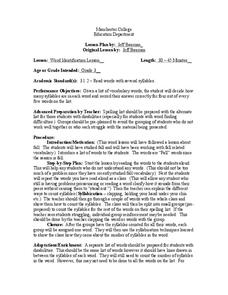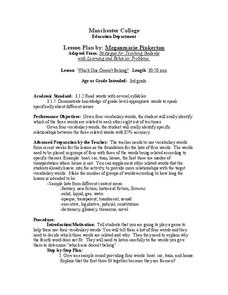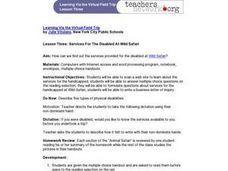Curated OER
Word Identification Lesson
Third graders listen to a list of Fall words and then repeat them aloud as a class. They discover how to count syllables either by holding their hand under their chin or clapping and practice together as a class and then split into small...
Curated OER
Understanding to Read and Describe It
Second graders, with hearing disability, practice vocabulary building strategies. In this vocabulary strategy lesson, a student practices sight words using word cards. The student verbalizes a sentence with the new words while the...
Curated OER
Helen Keller: An Amazing Woman
In this reading comprehension instructional activity, students read a true story about Helen Keller. Students fill in the 8 blanks in the story with the correct word from the word bank.
Curated OER
Candidate Obama Support and President Obama's Agenda
Pupils research categories within President Obama's agenda and create a PowerPoint presentation. In this President Obama agenda lesson, students research a category within President Obama's agenda and present their topic in a PowerPoint...
Curated OER
It's All in the Translation
High schoolers compare and contrast translations of Greek literature. In this dramatic literature lesson, students read and perform passages from four different translations of Euripides's Hecuba. High schoolers discuss how the...
Curated OER
Helen Keller
In this Helen Keller activity, students read about the life of the activist, then complete a variety of comprehension activities. An answer key is included.
Curated OER
The Hopes of Our Ancestors: The Impact of Immigration on America
Students research the immigration of America. In this American immigration lesson, students complete a unit of activities to learn about American immigration.
Curated OER
Which One Doesn't Belong?
Third graders identify words that are related with 80% accuracy. Given a list of four vocabulary words, 3rd graders identify specific relationships between three of the four words. They also identify which of the four words are not...
Curated OER
Go Fish
First graders explore rhyming words. They listen to the book One Fish, Two Fish, Red Fish, Blue Fish and discuss the rhyming words. After being placed into groups, they play the game, "Go Fish" and find matching rhyming words. They...
Curated OER
Special Education Students in the Mainstream Classroom
How to prepare your mainstream students for a special education student in their classroom.
Curated OER
Services for the Disabled At Wild Safari
Students discover and enter the website for Six Flags Amusement park. Individually, they identify and discuss the types of services available to the handicapped. After reading the website, they answer comprehension questions and write...
Curated OER
Religion and Deaf Education: The Contract Between Clerc and Gallaudet
Learners examine the issues surrounding the prevailing religious and cultural beliefs in the early 19th century United States and how they influenced the education of deaf people. They apply this information to modern day contexts.
Curated OER
A Woman's Story: The Autobiography of Mrs. Tom Thumb
Students examine the life of Lavinia Warren, the wife of Tom Thumb. They examine the impact of stereotyping and other behaviors by different groups. They examine roles and status in society as well.
Curated OER
Jingle Bell Bounce
Learners attempt to dribble the basketball in a predetermined sequence. After practicing several dribbling techniques, the game begins. This process should emulate the Jingle Bells song set music.
Curated OER
Photo-Based Reading Projects
Students practice using a digital camera and identify the various parts. As a class, they review recent vocabulary and signs used in their community. In groups, they take pictures of various items and write complete sentences describing...
Curated OER
Making A Felt Pouch
Students are engaged in the making of a felt pouch. They complete the project with the aid of the teacher because the lesson is meant for the Special Education population. Students answer the following focus question to set the context,...
Curated OER
Sneetches: Diversity of Learners
For Learners wanting to practice verbal/linguistic intelligence, any Dr. Seuss book is an excellent text for examining rhyming words. They explore words that rhyme with bully, mean, snooty, nasty, tease, harass, hurt.
Curated OER
Do You Know Your Schedule?
Students identify classes in their schedules and associate the class with the time of day it is held. They then name classes in sequential order according to the period during which it occurs.
Curated OER
Autism and Autism Spectrum Disorders: Disorders Extending Beyond the "Norm"
Learners develop an understanding of autism by engaging in an inquiry-based discussion. Pupils are exposed to the vast array of defining characteristics of autism spectrum disorders. They create posters about the developmental...
Perkins School for the Blind
What Would You Do If...?
What would you do if...? That's a great question, and, when posed to learners with visual impairments, a question that can foster concept development and speaking and problem-solving skills that relate to real-life situations. The...
Perkins School for the Blind
Left Versus Right
When you can't see, it is extremely important to be able to reorient yourself. Learners with visual impairments work though an activity to build spacial awareness based on moving left and right. A marker (bracelet, bell, or weight) is...
Perkins School for the Blind
Initial Consonant Activity
Bingo is a super fun game and can be used to reinforce a vast number of recognition skills. These bingo cards are prepared by constructing nine squares, each delineated with raised Wikki Stix or gluedyarn and containing a...
Perkins School for the Blind
Put the Shoe on Your Foot
Promote clothing identification, body part identification, and dressing skills acquisition with a fun and lively game. Each child takes turns grabbing a clothing item from the central clothing box. As he puts the item on, he sings,...
Perkins School for the Blind
Circle Time
Oftentimes children or teens with one or more disability are reluctant to participate in whole-group activities. Foster good participation, verbal expression, and social skills through daily circle time activities. Each day you and...

























